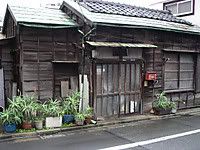Do you dare to open your house?

Momus: This is Atelier Bow Wow talking in Pingmag yesterday about a house they're making for two writers and their three children:
Atelier Bow Wow: Since both parents work from home we also came up with the idea to turn the entrance of the house into a bookshop, or a library, or an office that could be open to the public…
Pingmag: A private home open to the public?
Atelier Bow Wow: Yes, that is one very important concept we are always working on! During the modernisation, the Japanese houses became closed and only open to the families due to the separation of the living and workspace. Today it’s very bizarre when you walk through newly developed residential areas: the houses have gardens and balconies - but there’s no life outside which makes the residential area very limited for activities. There’s not enough redundancy.
Momus: That theme of mixing private and public reminds me of something. When I was about 17 my father opened a language college. Although the classrooms were out in an East Lothian village, the offices operated out of our Edinburgh house. The ground floor was staffed by two secretaries, Nora and Elizabeth. The front door of our house stayed open during office hours, like a shop or office door. In fact, the whole house basically stood open all day. People could wander in... and did. Once we caught two boys lurking in the hall, dubious looking characters. They asked if our house was the railway station.

Now this is David Duval Smith from Namaiki talking about his house in Tokyo in Theme magazine:
David Duval Smith: I grew up in a regular family in New Zealand, with a nice house and two cars. The lesson I learned from that experience was that the more you have, the more you have to protect. Right now I live in a hiraya (old, traditional wooden house) [actually, a hiraya is more like a bungalow -- an old, traditional wooden house is a mokuzou] built in the ’60s in Minami-Azabu, right behind the hip Roppongi district. The house is made of dark wood and the columns are really thin. But I love it, because these Japanese houses are made to expand their space, by opening up the shoji (rice paper screens), for example. It’s great how easily an abundance of air and light is let into the house. And sleeping on the futon is very efficient because you can just fold your bed and put it away, which also expands the space. Western beds waste so much interior space!

...Right now I’ve pretty much opened up my house for anybody to come and sleep in. I’ve left the keys outside for my friends to come and go as they like, and they can pull out their futons and sleep and stay overnight. I’ve opened up my studio too. It’s a free space, and anyone is welcome.
Momus: That theme of making your house available to anyone reminds me of Jim Haynes, who, in an extension of the 1960s party spirit (his autobiography is called "Thanks For Coming!"), lets all sorts of people (but especially East European women, it seems) stay at his house in Paris. He also throws buffet supper evenings where he lets a bunch of people come and eat at his place, as long as they cover their costs with a small donation when they arrive. Someone told me Jim's son Jesper has an open house in New York where, like David Duval Smith, he claims anyone is welcome. But when I went to New York in 2006 to be a performance artist I contacted Jesper to see if I could crash there. I got no reply.

Finally, this is Professor Justin Champion, in the last of a very interesting series of talks called What are Friends For? in BBC Radio 3's series The Essay. He's talking about Jacques Derrida's late work on politics, democracy and friendship. Derrida says that the democracy we have now is based on a "phallocentric" concept of brotherhood originating in ancient Greece, and that this model excludes the Other. (Derrida's notion of the phallocentric lines up with what I've called the homosocial.)
Justin Champion: In Derrida's view, the political values that combine to produce democracy -- sovereignty, power, representation -- are built round the idea of equality derived from a model of friendship between male citizens alone. This process has excluded the Other in many forms -- women, non-citizens. Making a new type of democratic politics, therefore, entails making a new form of friendship which Derrida labels hospitality. Here his language is dramatic, and very pertinent to our current condition.

Jacques Derrida: I have to welcome the Other, whoever he or she is, unconditionally, without asking for a document, a name, a context, or a passport. That is the very first opening of my relation to the Other. To open my space, my home, my house, my language, my culture, my nation, my state and my self. But of course this is a frightening thing. It's scary. If we decided everyone will be able to enter my space, my house, my home, my city, my state, my language, and if we think what I think, namely that this entering my space unconditionally may well be able to displace everything in my space, to upset, to undermine, to even destroy, then the worst may happen. And I am open to this. The best, and the worst.
Justin Champion: This is a powerful challenge to the rather attenuated and thin idea of friendship that is commonplace today. It's also rather grandiose and utopian. Making friends, in a cosmopolitan and diverse society, would involve radically revising many of our deep-seated prejudices and practices. It may be too late for many adults.